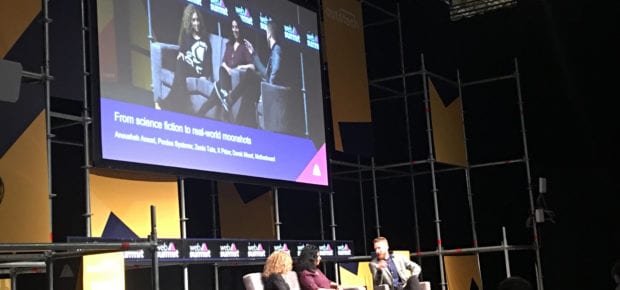November 8, 2016
In a discussion moderated by Motherboard’s Derek Mead, the first female private space explorer Anousheh Ansari (Prodea Systems) was joined by Zenia Tata (X Prize) to explore science fiction and its real-world applications.
Ansari spoke about her work with X prize and how she credits its success to the communities and connections it fostered around technology. Tata, who works with X Prize, continued on the subject by introducing two new X Prize efforts, one of which focuses on water abundance to alleviate the global water crisis by extracting water from the atmosphere. The other focuses on low-cost solutions for women’s safety, piloted by Anu and Naveen Jain.
Mead pivoted the conversation away from X Prize and to the broader panel topic of science fiction, asking both Ansari and Tata about the barriers between reality and science fiction. Both panelists agreed that science fiction is critical in implementing a futuristic outlook in an organization.
Tata discussed the role of technical science fiction writers, an area she anticipates will experience growth, even in mainstream companies that are considering exponential technology. Tata drew a clear line between what she called “techno-futurists” and science fiction writers. The writers, she argues, are more valuable to businesses because they bring the creative component of storyline development, a skill that enhances a business trajectory plan.
Placing the focus back on X Prize, Mead asked Tata to explain how exactly X Prize designs a prize. She explained it in a two core steps that involve establishing a “market horizon” or timeframe for the solution, which can be anywhere from 10 to 50 years in the future depending on the focus. She also said that it’s critical to understand the ideal scenario by identifying the desired impact that will underscore the moonshot.
Ansari added a piece of advice for futuristic thinkers, suggesting that they look for environments that let them explore otherwise “crazy” ideas because that’s the real leapfrog for advancement and confronting the once-thought impossible. Ansari concluded by sharing her eagerness around transportation-focused X Prize work. In particular, she’s fascinated by teleportation and experiential technology that will affordably allow people to be exposed to new places, including space.
Ansari is currently working on a project with a group of astronauts called Constellation that hopes to bring the space travel experience closer to home.
Before the panel wrapped, both Tata and Ansari urged the audience to continue to dream big and embrace challenges every day.





 Impact of Technology in 2024
Impact of Technology in 2024 Emerging AI Cybersecurity Challenges and Solutions
Emerging AI Cybersecurity Challenges and Solutions The Skies are Unlimited
The Skies are Unlimited Smart Cities 2030: How Tech is Reshaping Urbanscapes
Smart Cities 2030: How Tech is Reshaping Urbanscapes Impact of Technology 2023
Impact of Technology 2023 Cybersecurity for Life-Changing Innovations
Cybersecurity for Life-Changing Innovations Smarter Wearables Healthier Life
Smarter Wearables Healthier Life Infrastructure In Motion
Infrastructure In Motion The Impact of Tech in 2022 and Beyond
The Impact of Tech in 2022 and Beyond Cybersecurity, Technology and Protecting Our World
Cybersecurity, Technology and Protecting Our World How Technology Helps us Understand Our Health and Wellness
How Technology Helps us Understand Our Health and Wellness The Resilience of Humanity
The Resilience of Humanity Harnessing and Sustaining our Natural Resources
Harnessing and Sustaining our Natural Resources Creating Healthy Spaces Through Technology
Creating Healthy Spaces Through Technology Exceptional Infrastructure Challenges, Technology and Humanity
Exceptional Infrastructure Challenges, Technology and Humanity The Global Impact of IEEE's 802 Standards
The Global Impact of IEEE's 802 Standards Scenes of our Cyber Lives: The Security Threats and Technology Solutions Protecting Us
Scenes of our Cyber Lives: The Security Threats and Technology Solutions Protecting Us How Millennial Parents are Embracing Health and Wellness Technologies for Their Generation Alpha Kids
How Millennial Parents are Embracing Health and Wellness Technologies for Their Generation Alpha Kids Space Exploration, Technology and Our Lives
Space Exploration, Technology and Our Lives Global Innovation and the Environment
Global Innovation and the Environment How Technology, Privacy and Security are Changing Each Other (And Us)
How Technology, Privacy and Security are Changing Each Other (And Us) Find us in booth 31506, LVCC South Hall 3 and experience the Technology Moon Walk
Find us in booth 31506, LVCC South Hall 3 and experience the Technology Moon Walk Virtual and Mixed Reality
Virtual and Mixed Reality How Robots are Improving our Health
How Robots are Improving our Health IEEE Experts and the Robots They are Teaching
IEEE Experts and the Robots They are Teaching See how millennial parents around the world see AI impacting the lives of their tech-infused offspring
See how millennial parents around the world see AI impacting the lives of their tech-infused offspring Take the journey from farm to table and learn how IoT will help us reach the rising demand for food production
Take the journey from farm to table and learn how IoT will help us reach the rising demand for food production Watch technical experts discuss the latest cyber threats
Watch technical experts discuss the latest cyber threats Explore how researchers, teachers, explorers, healthcare and medical professionals use immersive technologies
Explore how researchers, teachers, explorers, healthcare and medical professionals use immersive technologies Follow the timeline to see how Generation AI will be impacted by technology
Follow the timeline to see how Generation AI will be impacted by technology Learn how your IoT data can be used by experiencing a day in a connected life
Learn how your IoT data can be used by experiencing a day in a connected life Listen to technical experts discuss the biggest security threats today
Listen to technical experts discuss the biggest security threats today See how tech has influenced and evolved with the Games
See how tech has influenced and evolved with the Games Enter our virtual home to explore the IoT (Internet of Things) technologies
Enter our virtual home to explore the IoT (Internet of Things) technologies Explore an interactive map showcasing exciting innovations in robotics
Explore an interactive map showcasing exciting innovations in robotics Interactively explore A.I. in recent Hollywood movies
Interactively explore A.I. in recent Hollywood movies Get immersed in technologies that will improve patients' lives
Get immersed in technologies that will improve patients' lives